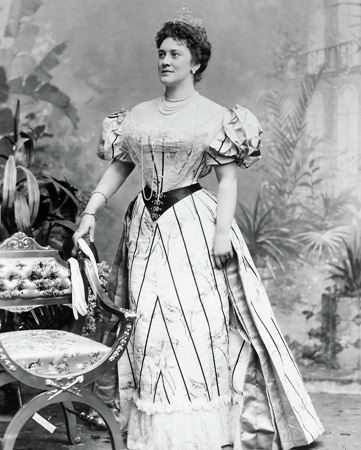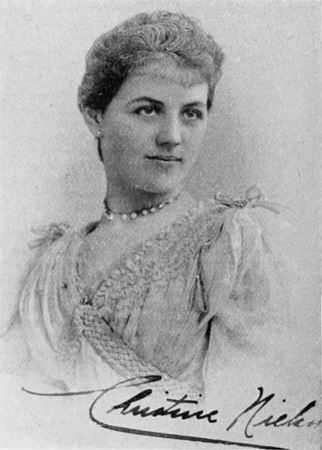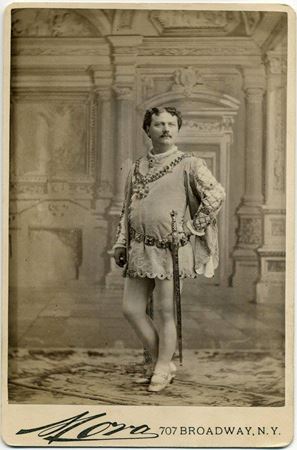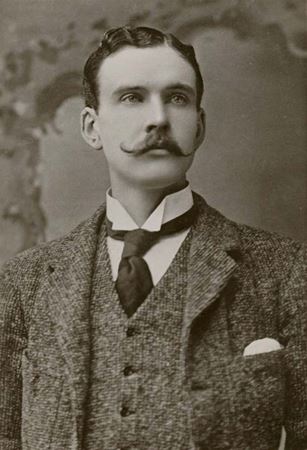March 13 and 14, 1893
The Chicago Orchestra first performed Mendelssohn’s oratorio Elijah on March 13 and 14, 1893, at the Auditorium Theatre in collaboration with the Apollo Musical Club. William L. Tomlins, the Apollo’s long-serving director, was on the podium. "The performance yesterday o’ertopped all previous ones in merit and has place among the finest efforts of the society," wrote a critic in the Chicago Tribune. “The chorus was present in full working strength, the voices were clear and sure, and leader and singers entered into their work with spirit and confidence, the result being a rendition of the choral portions of the oratorio that was eminently satisfactory.”
The principal soloists on hand were some of the preeminent international singers of the day, including soprano Lillian Nordica, contralto Christine Nielson-Dreier, tenor Italo Campanini and bass-baritone Plunket Greene.
American Lillian Nordica (1857–1914) was one of the foremost dramatic sopranos of the late nineteenth and early twentieth centuries. Following studies at the New England Conservatory, she established her career in Europe, before making her American opera debut in New York on November 26, 1883, as Marguerite in Gounod’s Faust with Mapleson’s company at the Academy of Music. She performed at Covent Garden and the Bayreuth Festival and was a stalwart with the Metropolitan Opera in New York for nearly two decades. A noted supporter of equal rights for women, Nordica frequently spoke out on the pay disparity between men and women singers. Using her celebrity status, she was a staunch advocate for the women’s suffrage movement, giving concerts, donating funds and regularly speaking publicly and in the press.
Her performance in Elijah was her debut with the Chicago Orchestra, and she sang “with the dramatic feeling and the brilliancy it demands.” Nordica later appeared with the Orchestra on numerous occasions, on subscription concerts at the Auditorium Theatre, at the World’s Columbian Exposition and as a leading artist with the Metropolitan Opera on tour.




Originally from Madison, Wisconsin, contralto Christine Nielson-Dreier (1866–1926) gained initial acclaim during her first tour of Europe in 1889, especially at the Palais du Trocadéro during the Exposition Universelle in Paris. The following year, she performed at the concert dedicating the grand organ at the Auditorium Theatre. During the first week of the Chicago Orchestra’s inaugural season, she was soloist with the ensemble and Theodore Thomas on the first run-out concert to to Rockford, Illinois, on October 18, 1891. Nielson-Dreier later appeared with the Orchestra at the World’s Columbian Exposition and on subscription concerts at the Auditorium, and she also was soloist at Fourth Presbyterian Church for many years. In Elijah, her performance was noted as a “pleasant feature of the evening. She sings with taste, intelligence, and skill,” delivering her “finest work” in the aria “O Rest in the Lord.”
Italian tenor Italo Campanini (1845–1896) established his career primarily in London before becoming the first leading tenor at the Metropolitan Opera. He inaugurated the company’s new house on October 22, 1883, in the title role in Gounod’s Faust with Christine Nilsson (not to be confused with Christine Nielson-Dreier) as Marguerite. Campanini had previously appeared with the Chicago Orchestra on subscription concerts as well as the ensemble’s first performances of Berlioz’s Damnation of Faust during the inaugural season.
(Italo’s brother and conductor Cleofante Campanini made his debut in this country in New York in 1888, leading the U.S. premiere performances of Verdi’s Otello, with his brother later taking over the title role. In Milan, he was conductor for the premieres of Cilea’s Adriana Lecouvreur at the Teatro Lirico in 1902 and Puccini’s Madama Butterfly at La Scala in 1904. In 1909, he was appointed music director of the Chicago Grand Opera Company, the city’s first resident opera company.)
Campanini must have been under the weather during the run of Elijah in 1893. Charles A. Knorr (1852–1937) performed the tenor solos on March 13, and the Chicago Tribune review for the second performance reported “the indulgence of the audience was asked for Sig. Campanini. The music of the part of Obadiah he sang carefully and with fairly good success.”
The debut of Irish bass-baritone Plunket Greene (1865–1936), during this, his first tour of the United States, was one of the most anticipated events of the season. Singing the title role in these performances of Elijah, he possessed “rare qualities of a beautiful voice, artistic taste, thorough musicianship, and strong, emotional power . . . He is an artist in the best sense of the word, and his singing of the music of Elijah last night gave thorough, keen delight, and satisfaction. . . . Anything more beautiful in vocal finish or more touching in expressiveness than the latter noble air as sung by Mr. Greene has rarely been heard in this city.”
Greene continued to appear with the Orchestra, on subscription concerts at the Auditorium Theatre, at the World’s Columbian Exposition and on tour at the Cincinnati May Festival. A close friend of Sir Edward Elgar, Greene was a soloist in the world premiere of The Dream of Gerontius in October 1900, was the dedicatee of Ralph Vaughan Williams’ Songs of Travel and in 1892 created the title role in the premiere of Sir Hubert Parry’s Job (later marrying the composer’s daughter). He authored Interpretation in Song, a valuable instruction book for singers; a biography of composer Charles Villiers Stanford; and Where the Bright Waters Meet, a testament to his love of fly fishing.
This article also appears here.



